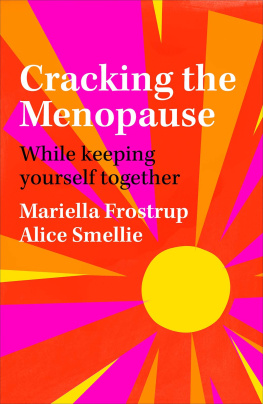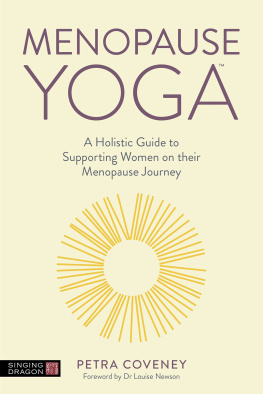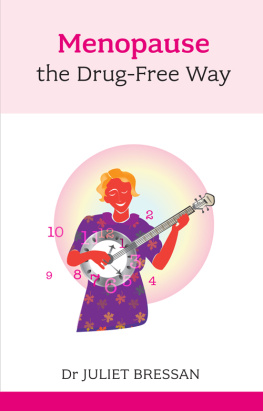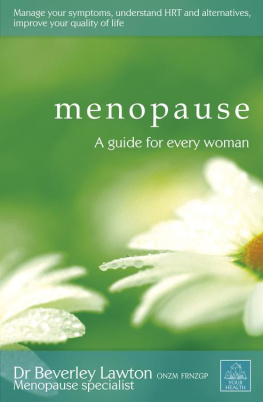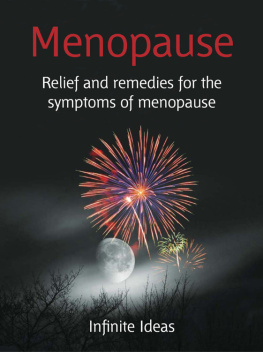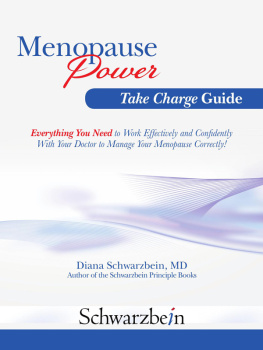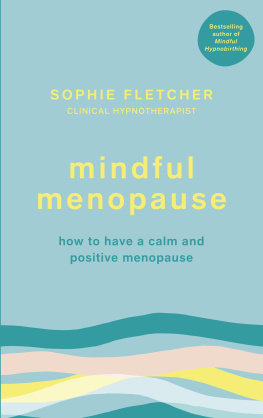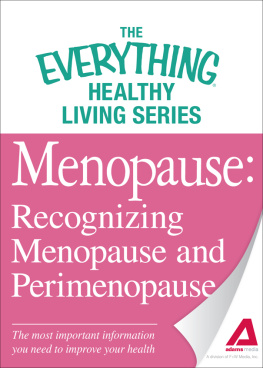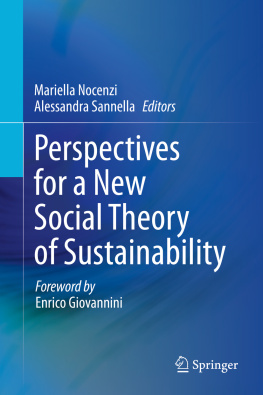Mariella Frostrup - Cracking the Menopause: While Keeping Yourself Together
Here you can read online Mariella Frostrup - Cracking the Menopause: While Keeping Yourself Together full text of the book (entire story) in english for free. Download pdf and epub, get meaning, cover and reviews about this ebook. year: 2021, publisher: Pan Macmillan UK, genre: Romance novel. Description of the work, (preface) as well as reviews are available. Best literature library LitArk.com created for fans of good reading and offers a wide selection of genres:
Romance novel
Science fiction
Adventure
Detective
Science
History
Home and family
Prose
Art
Politics
Computer
Non-fiction
Religion
Business
Children
Humor
Choose a favorite category and find really read worthwhile books. Enjoy immersion in the world of imagination, feel the emotions of the characters or learn something new for yourself, make an fascinating discovery.
- Book:Cracking the Menopause: While Keeping Yourself Together
- Author:
- Publisher:Pan Macmillan UK
- Genre:
- Year:2021
- Rating:3 / 5
- Favourites:Add to favourites
- Your mark:
- 60
- 1
- 2
- 3
- 4
- 5
Cracking the Menopause: While Keeping Yourself Together: summary, description and annotation
We offer to read an annotation, description, summary or preface (depends on what the author of the book "Cracking the Menopause: While Keeping Yourself Together" wrote himself). If you haven't found the necessary information about the book — write in the comments, we will try to find it.
Cracking the Menopause: While Keeping Yourself Together — read online for free the complete book (whole text) full work
Below is the text of the book, divided by pages. System saving the place of the last page read, allows you to conveniently read the book "Cracking the Menopause: While Keeping Yourself Together" online for free, without having to search again every time where you left off. Put a bookmark, and you can go to the page where you finished reading at any time.
Font size:
Interval:
Bookmark:
Contents

Alice Smellie

To our mothers who made us think, to our sisters and friends who made us talk, and to our daughters who made us want to change their world.

Mariella Frostrup is one of the UKs most respected broadcasters and columnists. Her contribution to arts and literature along with her advocacy on gender and social issues have placed her at the forefront of the cultural landscape. She made the groundbreaking BBC1 documentary The Truth About the Menopause and she currently presents her own daily show on Times Radio covering issues of the day, from arts and culture to politics. She lives in Somerset with her husband and two children.

Alice Smellie is a journalist who has written for many publications, including the Daily Mail, the Daily Telegraph and Marie Claire. She lives in Somerset with her three children and two dogs.

Poisonous and dangerous, with the ability to kill children just by looking at them.
Where do you start, with centuries of ignorant assumption and ludicrous diagnosis to condense into a few historical snapshots? Happily, we dont have to plunge back into the primordial swamps, as there isnt much reference to older womens bodies until the seventeenth century. Menopause is very much a medical afterthought, from classical times onwards. Being unique to women, it was obviously unimportant and uninteresting unless it impacted on the lives of the ruling classes, who were, almost to a man, men. I say this with heavy sarcasm, which is laced with unassailable truth.
Looking back through the arch of history, you certainly come to the conclusion that menopause needs a spin doctor. In 1969, the American doctor David Reuben, in his bestseller Everything You Always Wanted to Know About Sex, offers a rare snippet of positivity by informing us that, As oestrogen is shut off a woman becomes as close as she can to being a man, (thats the good news), with the caveat that, Having outlived their ovaries, they may have outlived their usefulness as human beings. Less good. And Reuben is allegedly on our side. But this is the tone that is common throughout the ages. Theres a Whoops, its all over love subtext to almost every written word or comment made about the end of female fertility, whether it be medical or literary.
Peering back to the first dim documentation certainly compounds the sense of looming disaster. If periods were called the curse, then what followed was nothing short of a death sentence!
Lets start with ancient times: those wonderful Greek and Roman men who were eternally immortalized in marble and are still studied by classics students. Its unlikely youll be able to conjure up any female names.
In fact, fifty-one is the average age at which we have our final period. In terms of consistency, the time of menopause appears to be one of the most stable incidences in human biology.
There was certainly no interest expressed about perimenopause, the years preceding the menopause itself, when hormones start to go up and down like an opinion poll about the top ten hottest Greek gods.
Id be tempted to scrutinize Aristotles pioneering philosophies with a stern eye if they are anything like as flawed as his description of womens bodies. According to him, women contain too much blood due to our coldness, general ineptitude, and less active lifestyle. Periods are the process of getting rid of the excess blood, whereas men of course are constructed with perfect balance and just the right amount of heat and blood (which they make into semen). This idea of menstruation as a cleansing process of some sort endures for almost another two thousand years. (Incidentally, Aristotle thought of a woman as a mutilated male.)
Id be tempted to scrutinize Aristotles pioneering philosophies with a stern eye if they are anything like as flawed as his description of womens bodies. According to him, women contain too much blood due to our coldness, general lack of ability, and less active lifestyle.
David Reuben was toward the end of a long line of experts to offer the opinion that, as women go beyond menopause and their periods stop, they become more masculine, though, as he says, Not really a man, but no longer a functional woman. In some societies, including Ancient Greece, there were (and still are) freedoms given to post-menopausal women as a reward, one presumes, for getting so close to the idealized marvellousness of men.
As we move on through the centuries, interest in the menopause remains pretty static, a disinterested medical shrug. A sixth-century physician, Aetius, suggested that the very fat cease early I am pretty sure that, had she been a man, thered be clear documentation and a large medical school in his name, with a big statue outside. The Father of Gynaecology, hed be called. Instead, theres an ongoing debate: Were unsure. Was Trotula a woman or a pseudonym?
Then theres Saint Hildegard of Bingen in twelfth-century Germany, who was staggeringly pioneering. Her observation, the menses cease in woman from the fiftieth year and sometimes in certain ones from the sixtieth when the uterus begins to be enfolded and to contract so they are no longer able to conceive, may not be entirely accurate, but is not that far removed from our level of understanding today. Hildegard, who wrote classical music that is still played today and founded two abbeys, very much flew the flag for post-menopausal success. Aged sixty, she went on four preaching tours, in spite of women having been forbidden to do so. And at least she was a member of the female sex, with hands-on experience, rather than one of the numerous mumbling men who felt qualified to offer their unqualified opinions on all matters female over the centuries.
Moving on up through our bloody literally history, in the Middle Ages our inability to get rid of what was considered toxic blood meant that menopausal women were seen as bubbling cauldrons of poisons. We didnt have the strength to expel them, and suffered terribly, till we dropped dead from one of the many venoms we harboured.
The thirteenth-century German philosopher and scientist, Albertus Magnus, whose day job was German Catholic Dominican Bishop, wrote a dark tome called De Secretis Mulierum (Womens Secrets). This cheery book was filled with insights such as, The retention of menses engenders many evil humours.
Magnus and I think its fair to suggest that he wasnt exactly a jolly family man also believed that older women were poisonous and dangerous, with the ability to kill children just by looking at them. Sometimes, when a teen is being particularly infuriating, and begging to stay on at a party, for example, it would be a useful threat. Midnight, or I come in and LOOK at you. What a typical menopausal reference though. The moment its remotely interesting to medics, academics and men same thing its evident that its judged to be a scourge rather than a liberation. Typically, his flagrant inaccuracies didnt stand in the way of his career success; Magnus was later canonized as Saint Albert the Great, patron saint of the natural sciences.
Next pageFont size:
Interval:
Bookmark:
Similar books «Cracking the Menopause: While Keeping Yourself Together»
Look at similar books to Cracking the Menopause: While Keeping Yourself Together. We have selected literature similar in name and meaning in the hope of providing readers with more options to find new, interesting, not yet read works.
Discussion, reviews of the book Cracking the Menopause: While Keeping Yourself Together and just readers' own opinions. Leave your comments, write what you think about the work, its meaning or the main characters. Specify what exactly you liked and what you didn't like, and why you think so.

